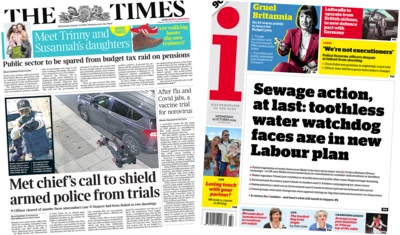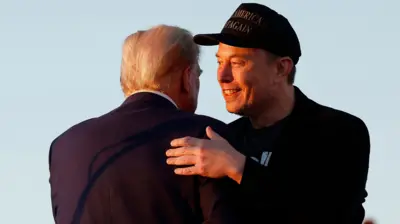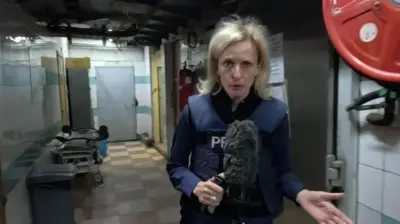We've updated our Privacy and Cookies Policy
We've made some important changes to our Privacy and Cookies Policy and we want you to know what this means for you and your data.
David Cameron faces a history of complexity on US trip
- Author, Kevin Connolly
- Role, ґуПуґ«ГЅ News, Washington
In modern politics perception is everything and armies of diplomats and press officers are engaged to make sure that we perceive what we are meant to perceive.
When former Prime Minister Gordon Brown last came to Washington the trip was held to be a disaster.
He was portrayed as a kind of foreign-policy Norman Wisdom, reeling and stumbling from one humiliation to another.
There was no state dinner. He presented President Barack Obama with a fabulous gift carved from the wood of an old slaving ship and received in return just a couple of DVDs. And finally their brief joint press conference was conducted sitting in easy chairs, rather than standing at lecterns.
It was a catastrophe; Gordon Brown had been snubbed and the special relationship just was not special any more.
David Cameron's first trip to Washington as prime minister has been calibrated with agonising care to ensure that even the thinnest-skinned socialite or hardest-hearted tabloid headline writer could not possibly interpret it as humiliating.
There were podiums; there was the obligatory over-run of talks to imply a closeness bordering on hunger for each other's company and there was the unique access - how many other foreign leaders have been shown the carefully-tidied bedrooms of the Obama daughters? There was heavy-handed banter about whether you drink your beer warm or cold.
And there were the words - which were decidedly warm.
A 'special relationship'
Britain tends to work itself into a frenzy over just how special the "special relationship" remains in the modern world and America does not.
But Mr Obama made a heroic effort to put the issue to bed, talking of how the two men had made a brilliant start as partners, how the two countries had the closest intelligence co-operation of any partners on earth and declaring simply that the US has "no closer ally and no stronger partner".
This is not, you suspect, about the White House preferring Mr Cameron to Mr Brown - it is possible that Team Obama studied how Mr Brown's trip was reported and realised that its attempts to cut some of the flummery out of these visits had backfired.
Mr Cameron himself had rather a deft go at putting the issue to bed in an article written for the Wall Street Journal on the morning of his meeting at the White House.
He set out his own links with the United States - and his love of the place and what it has done for the world - in a way which will appeal to many Americans.
And he warned against the absurdity of applying the techniques of what he called Kremlinology to the relationship between the UK and its oldest and staunchest ally. He even offered this accurate depiction of how proponents of the view that the relationship is in decline have worked.
"They forensically compute the length of meetings," he wrote, "whether it's a brush-by or a full bilateral... dissecting the location and grandeur of the final press conference - fretting even over whether you're standing up or sitting down together."
However ludicrous it might be, however, it certainly looked as though Team Cameron and Team Obama had worked hard in advance to shut down any possibility of a snub story.
Which was perhaps just as well since the inter-linked stories of the oil leak in the Gulf of Mexico and American suspicions that BP may somehow have been involved in the decision to free the Lockerbie bomber presented problems of real substance to set alongside the vexed issues of the global economy and the war in Afghanistan.
Mr Cameron's opposition to the release of Abdelbaset Ali al-Megrahi while he was still in opposition is politically useful in Washington, where the decision was greeted with deep anger.
The prime minister spoke of asking the cabinet secretary to look back through old documents to see what else might be released and Mr Obama talked of the need to have all the facts in the case "laid out there".
But there was no awkward pressure on Mr Cameron for a full-blown British investigation. Scotland, which actually released al-Megrahi, has already held one.
Common ground
There was common ground, too, on the need for BP to plug the oil leak in the Gulf of Mexico, clean up the waters and pay out appropriate compensation.
The overall message was that such issues which some people had speculated might damage the special relationship could in fact be dealt with through it, a practical demonstration of its strength.
One interesting issue to watch which will also test that relationship is the campaign in Britain against the planned extradition to the US of Gary McKinnon, a computer hacker who faces charges related to breaching security on Pentagon computers.
Mr McKinnon could face 60 years in jail here and Mr Cameron has made it clear in the past that he thinks Mr McKinnon - whose supporters say he is too vulnerable to cope with imprisonment in the US - could be tried in Britain instead.
The matter was discussed and, although neither leader committed himself to a deal, it is clear that some sort of negotiation is under way. It will be interesting to see if the special relationship pays off in Mr McKinnon's case.
So, plenty of substance in this first White House summit for David Cameron, but the biggest question perhaps is whether he succeeded in heading off our tendency for discussing tone and body language over politics and diplomacy.
I would not bet on it.
When Harold MacMillan first visited John F Kennedy in 1961 he was treated to lengthy political talks in Washington and a trip to Key West in Florida with the presidential entourage. It was long, intimate and packed with Cold War substance.
The British reaction? To wonder if the Special Relationship was still "special"...
Top Stories
More to explore
Most read
Content is not available








